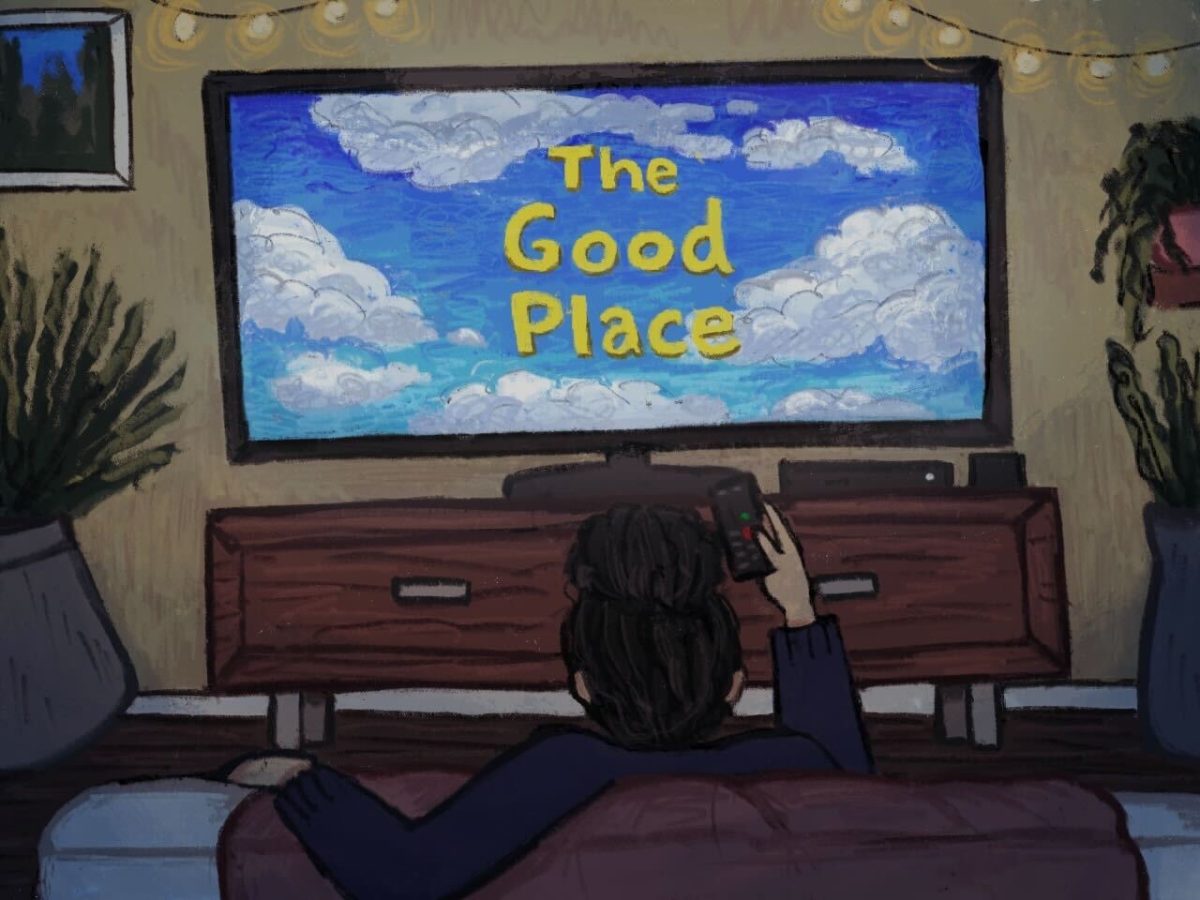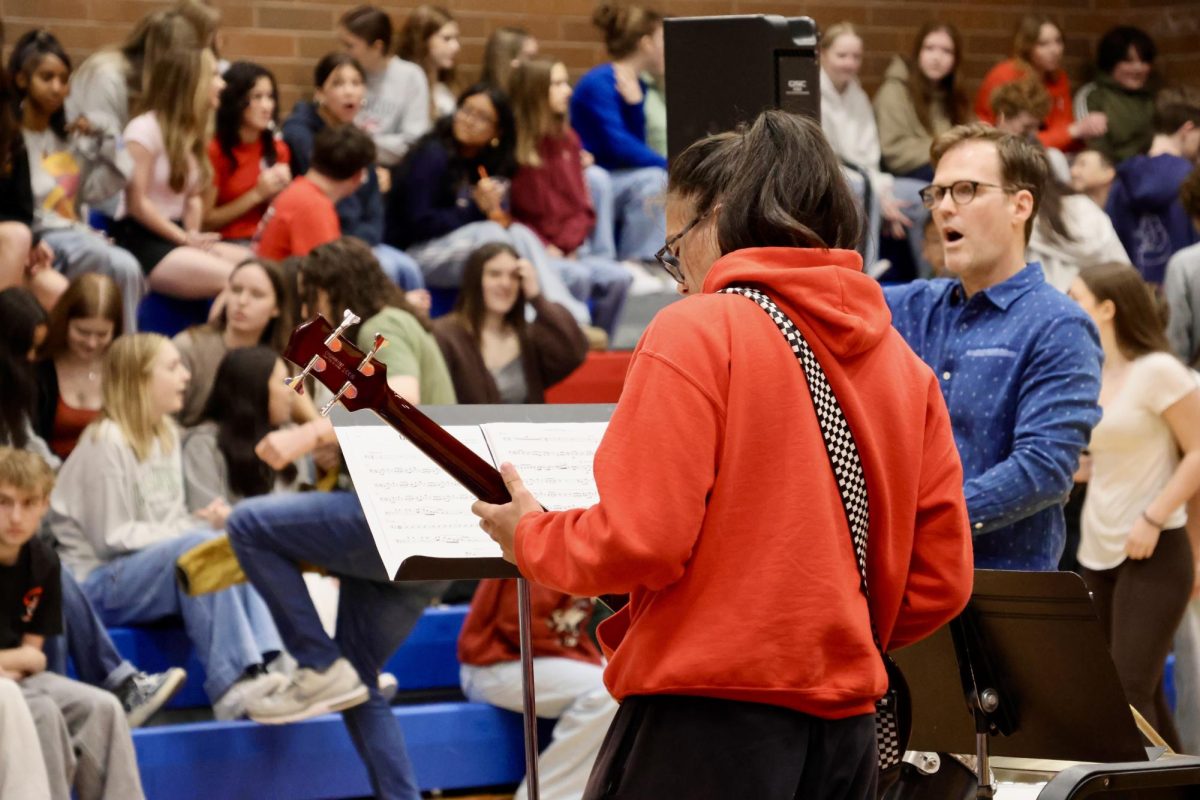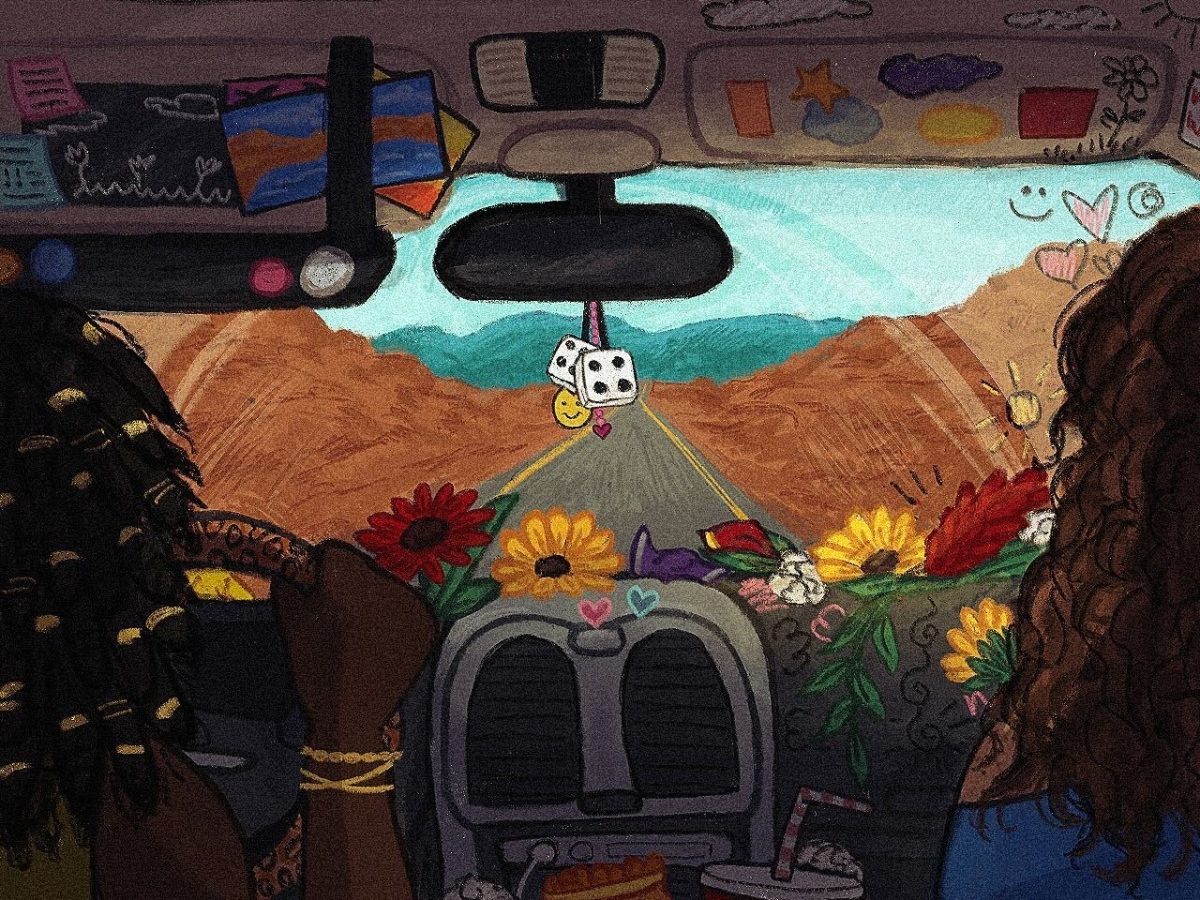If you were ever wondering what should be your next watch, “The Good Place” should be at the top of your list.
Premiering in 2016 and streaming on Netflix and Apple TV, “The Good Place” revolves around a seemingly perfect paradise where people go after they die, reserved only for those who lived exceptionally moral lives on Earth and gained enough “good points.”
It follows the afterlife of the protagonist, Eleanor Shellstrop (Kristen Bell), who wakes up with everything that she supposedly hoped and wished for while she was on Earth.
The problem?
She knows that she does not belong there.
Eleanor was not a role model human, being more selfish than caring, and rude instead of kind.
Her actions reflected a “me first” mentality, and she knew that she was not one of those exceptionally moral humans compared to everyone else in The Good Place.
Determined to avoid being found out and sent to The Bad Place, she teams up with a few other residents in The Good Place along the way — Chidi Anagonye, an ethics professor, Jianyu Li, a monk who has taken a vow of silence, Tahani Al-Jamil, a social helper, and Janet, a non-human assistance supercomputer, as well as Michael, the architect and community leader of The Good Place neighborhood.
From here, without revealing any spoilers, the show dives deep into themes of ethics, self-improvement, and redemption, all wrapped in funny commentary all throughout. It examines ethical and philosophical questions in a way that is understandable and fun.
I first started watching “The Good Place” after it was recommended by a teacher and expected a funny, feel-good show that would pass the time.
But once I watched the first few episodes, I realized it was something completely different. I was hooked, watching all four seasons of the show in the span of five days.
I did not expect for “The Good Place” to make me think about morality, personal growth, and what it means to be a good person. This is a show that taught me a lot about life and how to live a good one while also managing to incorporate those hilarious and heartwarming moments all at the same time.
It is one of those rare shows that kept me engaged throughout all four seasons because of the funny content but also kept me on my toes because you never knew what was coming next or when your mind was about to churn from a meaningful or deep scene.
The plot is not the only thing that makes the show amazing — it is also the characters.
Each and every one of them were filled with traits that we each have, such as anxiety, worry, confusion, and selfishness. But they were also all thoughtful, generous, hardworking, and loyal.
Every one of them had so much more to them than meets the eye and showed us how every person we meet has so much depth to them no matter how we judge them. They were relatable to everyone watching, making me feel like I could actually be in the characters’ shoes and really understand them.
Through its characters and storyline, this show teaches us different philosophies, such as whether intentions matter more than outcomes, or what is the right thing to do.
Over the course of watching all 53 episodes twice — once by myself and once again with my family — I found myself reflecting on these three lessons that the show explored.
People Can Change
Throughout the whole show, we are faced with the question: are people capable of changing and becoming good?
As we follow the afterlife of Eleanor and the other residents living in the Good Place, we find an answer to this complex question.
One of the central messages of “The Good Place” is that no one is stuck being who they’ve always been. Each one of the characters are capable of growing and evolving, often in ways we did not expect.
From the beginning, we see how Eleanor continues to be a selfish person just like she was up until the moment she entered the afterlife. She was someone who did not care for both others and cared only for herself, but by the end of the show, it is the complete opposite.
The journeys of her and all of the other characters, show us that even those who we consider too bad to ever become good should be given the chance to learn, improve, and choose to be better.
Each of the characters slowly grow into better people bit by bit not because someone forced them to, but because they chose to.
It really surprised me when I realized that their growth did not come from being perfect or doing everything right, but by being willing to admit their mistakes and try again.
“The Good Place” showed me that change, for myself and for anyone, is possible, but it starts with honesty and effort. So no matter where you are starting from, there is always a path to become someone better.
Morality is Complicated
Through watching the actions of each of the characters and seeing their “good points,” we come to understand that morality does not have a fixed answer.
“The Good Place” explores how doing the right thing is not always so easy or clear-cut and that life is not black and white.
It makes us think about questions such as: Do your actions matter more than your intention? What if helping one person accidentally harms another? How much of what we do is based on what society expects from us?
As we see the characters struggle with these kinds of questions, we are able to reflect on our own choices and how even a simple decision can have complicated effects.
It can be hard to make the right decision or to even know what is the right decision. Sometimes, even with the best intentions, we mess up.
We come to realize that our intentions can hold as much weight as our actions.
Doing something good does not just automatically mean that someone is a good person. The reasons behind our actions are just as important as the actions themselves.
If someone is only helpful or generous to make themselves look better or to keep track of their good deeds, that is not morality; it is self-interest.
This show challenges what we know about right versus wrong, and even if we feel like we are making the right decision, we might not be.
Self-Improvement is a Lifelong Journey
The idea that people don’t become good overnight is one of the most powerful messages to me that the show portrays.
The characters in “The Good Place” aren’t perfect. They did not just wake up one day as perfect people. They struggled, failed, and tried again.
That is the whole point.
They are constantly working on themselves, learning from each other, and aiming to become better than they were before.
We can’t become good right away, we need the opportunity to try again. The whole point of life is to fail, learn and keep trying to become good, which is what in reality makes us better.
The show makes it clear that becoming a better person is not about arriving at perfection, it is about continuing to learn and grow no matter where you are in life.
Even if someone thinks that they are a good enough person, there is still something to improve. There’s no finish line to reach, but that means there is also not a certain time that we need to have everything figured out.
Each of the characters’ afterlives and actions show us that self-improvement does not have to be fast to be meaningful.
We have things that we are trying to unlearn, improve, and understand about ourselves. That is normal.
“The Good Place” reminds us to be patient, not just with others, but with ourselves and to allow time to learn and develop.
Even with all of these deep and insightful lessons, “The Good Place” never stops being entertaining. It is a show that is creative, full of unexpected turns, and has an amazing cast.
One moment you are going to be laughing at a joke, and the next, you will be rethinking the way you handle everyday choices.
So if you’ve ever wondered about life and morality or just want a show that will make you laugh and think, come check out “The Good Place.”









